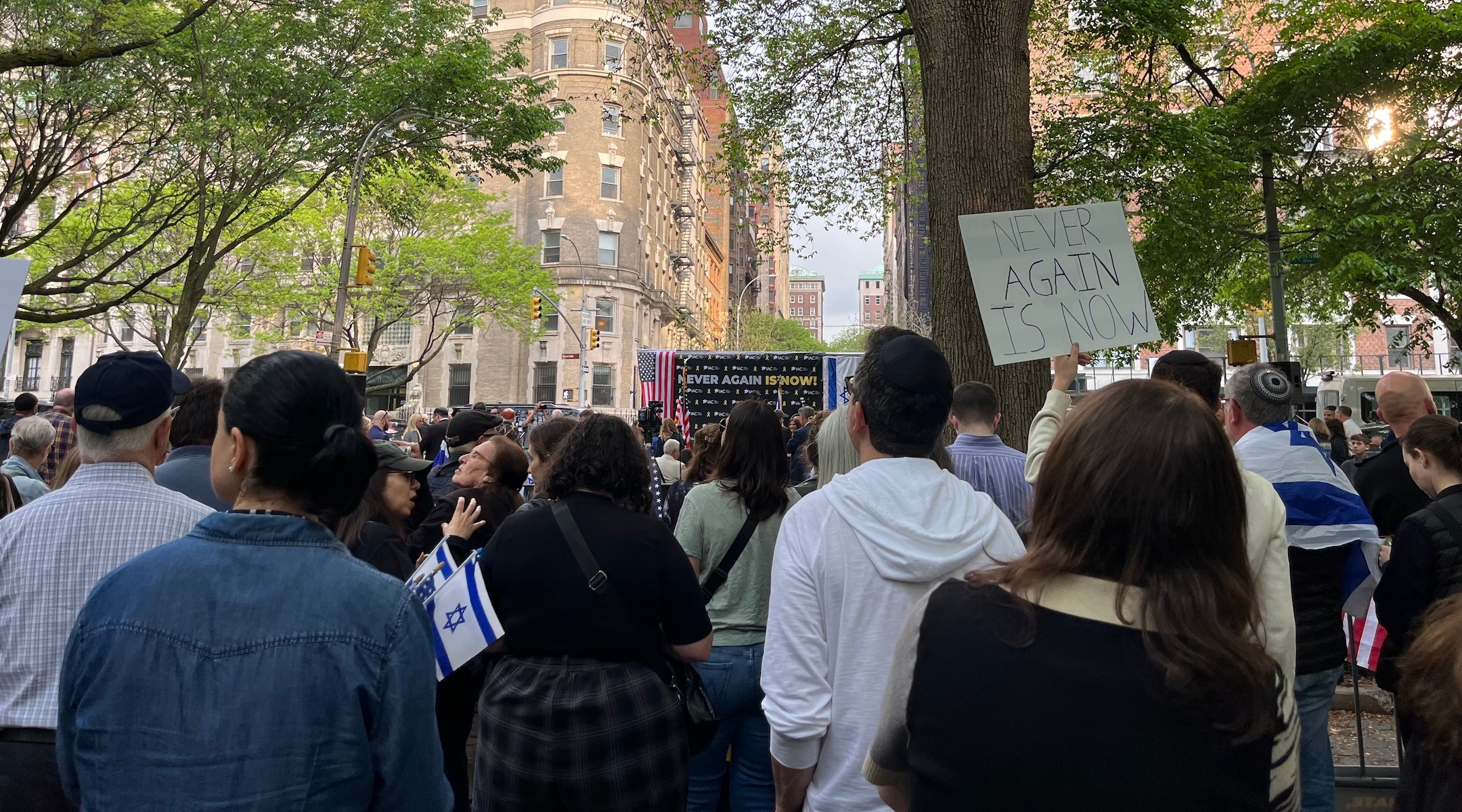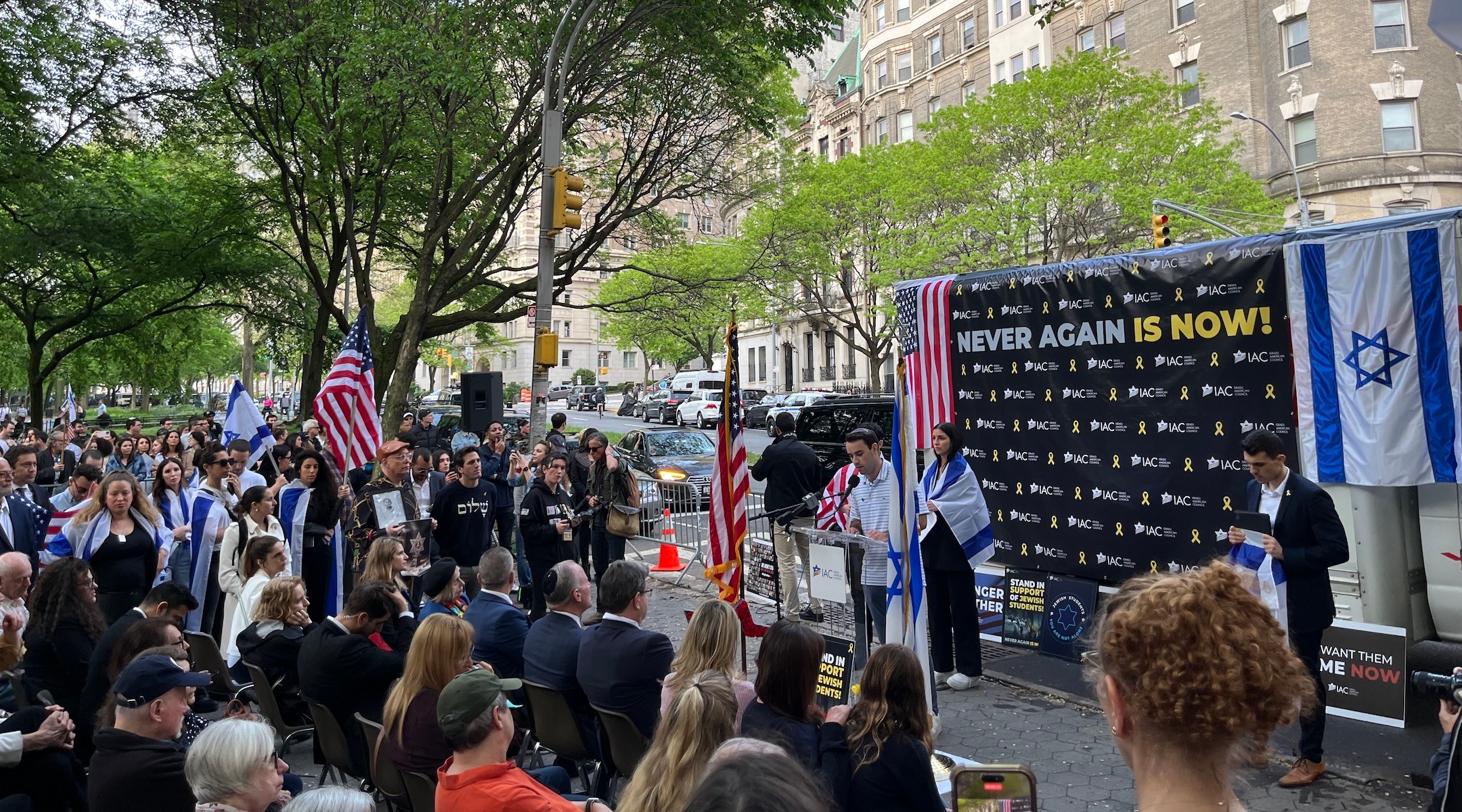(New York Jewish Week) – Israel’s ambassador to the United Nations called Columbia University one of the “new hotbeds of Nazi-like ideology” as hundreds of people gathered for a rally decrying antisemitism at the school on Yom HaShoah, Israel’s Holocaust Remembrance Day.
The crowd and speakers at the rally, held in Riverside Park, were mostly Israeli adults unaffiliated with the Ivy League university. A couple blocks away, Columbia’s main Morningside Heights campus projected an air of relative calm during finals period, less than a week after police stormed a building occupied by students and arrested more than 100 people.
On the outskirts of campus, which remains closed to the public, students chatted in small groups, worked on homework and grabbed dinner together. The school announced Monday that its commencement ceremony was canceled, but few signs were visible of the pro-Palestinian encampment that took over the quad for weeks, sparking a nationwide student movement calling on universities to divest from Israel.
The only remnants of last week’s turmoil were a handful of police and security guards in the 116th St. subway station and the nearby main campus entrance. In front of the main campus gates, metal barricades blocked a subway entrance and surrounded bus stops.
The Riverside Park rally — promoted via email as a “Holocaust Memorial Ceremony at Columbia University” — was led by the Israeli-American Council and sponsored by a range of centrist and right-leaning national Jewish organizations, along with one pro-Israel student group. Speakers sought to keep attention on accusations that the protesters harassed Jewish students and created a hostile campus atmosphere.
“I am watching antisemitism become normal,” Columbia sophomore Elisha Baker told the crowd. “Universities have now become a platform for brainwashing.”
Days before Columbia’s encampment formed, Baker posted a video online in which he and some friends went to a pro-Palestinian rally holding an anti-Hamas sign and American flags, one of which was set on fire. Earlier on Tuesday, he posted that commencement had been canceled due to a “self-righteous, violent, pro-terror mob.”
The rhetoric from the podium throughout the evening was similarly heated. Several of the speakers drew a parallel between the campus protests and the Holocaust.
“The events we are witnessing today on college campuses are reminiscent of Kristallnacht in Nazi Germany,” said Gilad Erdan, Israel’s U.N. ambassador. “Words are being weaponized to spread bigotry, to incite violence, to inflame the targeting of Jews. Columbia, Harvard and UCLA are the new hotbeds of Nazi-like ideology, branding Israel as the root of all evil and the Jewish people as a global scourge.”
Ofir Akunis, Israel’s new consul general in New York, also suggested that the protests at Columbia were reminiscent of Kristallnacht, the notorious 1938 Nazi pogrom.
“They started with Jewish boycotts. Then they burned Jewish books. They broke the windows of Jewish synagogues and homes, and only then declared a final solution to the Jewish question. Nothing was done to stop it. Nothing,” he said. “Over the past few weeks, we saw many antisemitic events. On American college campuses, at institutions like here at Columbia, they also broke windows and even blocked Jews from attending classes.”

Jewish New Yorkers hold signs that say “Never Again is Now” during a rally in honor of Yom HaShoah in Riverside Park, New York, May 6, 2024. (Julia Gergely)
Other speakers also discussed the lessons of the Holocaust more broadly. Lizzy Savetsky, a popular pro-Israel influencer, encouraged attendees to be proudly Jewish.
“We cannot hide from our Jewish identities,” she said. “Our people have clung to our traditions, values, and faith despite the worst atrocities committed in human history.”
She added, “And now that our past is becoming our present, we have a choice. Will we let those who died for being Jewish die in vain?”
The final speaker at the rally was 86-year-old Holocaust survivor Tova Friedman, who talked about her childhood in Poland and remembered how her father dismissed threats against the Jewish community until it was too late. “He went about his business. Because he did that, I ended up in Auschwitz,” she said.
“My Holocaust memories have been reawakened,” she added. “We need to take this seriously. At least we know what’s going on and we can get organized so that we can do something about it.”
The rally did not attract any counter protests — though Akunis, a former Likud cabinet member and ally of Prime Minister Benjamin Netanyahu, did draw some backlash from the crowd. Hours after Hamas announced that it had accepted a framework for a hostage release and ceasefire deal that Israel said fell short of its requirements, about a dozen rally participants stayed to chant “Bring them home now” at Akunis and demand an immediate deal.
The New York Jewish Week brings you the stories behind the headlines, keeping you connected to Jewish life in New York. Help sustain the reporting you trust by donating today.





